-
又是把Java基础知识学废的一天,new 一个对象数组,操作时报空指针异常
又是把基础知识学废的一天
日常开头~

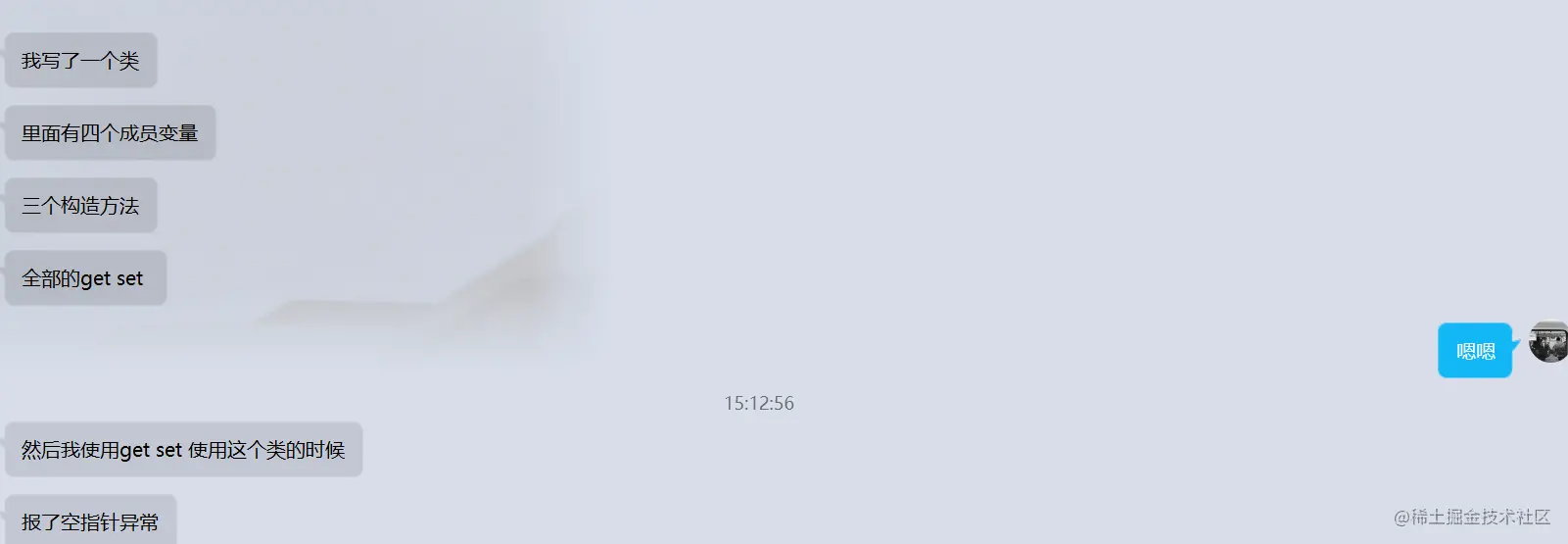
别慌,懵就懂了,因为没有上下文啊~
然后开始告诉我错误是什么~
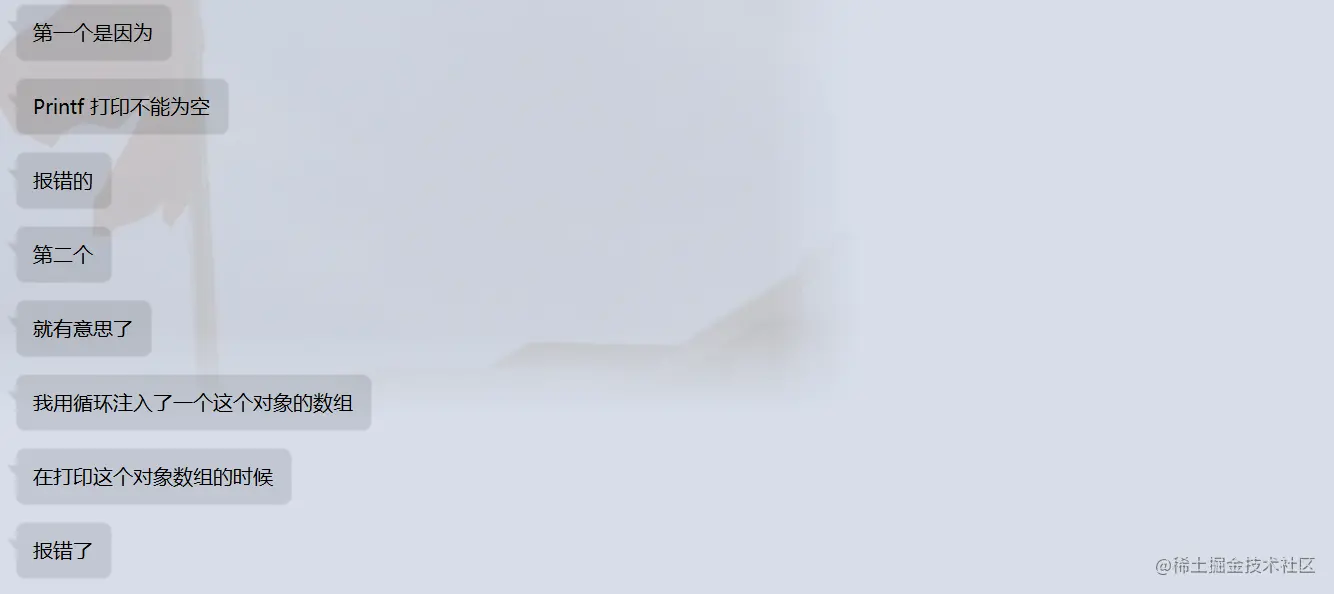
一开始看到数组对象时,我是有想法的,包括他这个错误,我隐隐约约感觉我学过这部分的知识,有点久远的感觉~
发来了有趣的代码
- public class ThirdInfo {
- private String title;
- private int number;
- private String pay;
- private String count;
-
- @Override
- public String toString() {
- return "ThirdInfo{" +
- "title='" + title + ''' +
- ", number=" + number +
- ", pay='" + pay + ''' +
- ", count='" + count + ''' +
- '}';
- }
-
- public ThirdInfo(String title, String count, String pay) {
- this.title = title;
- this.pay = pay;
- this.count = count;
- }
-
- public ThirdInfo(String title, int number, String pay) {
- this.title = title;
- this.number = number;
- this.pay = pay;
- }
- public ThirdInfo(String title, String pay) {
- this.title = title;
- this.pay = pay;
- }
- public String getTitle() { return title; }
-
- public void setTitle(String title) { this.title = title; }
-
- public int getNumber() { return number; }
-
- public void setNumber(int number) { this.number = number; }
-
- public String getPay() { return pay;}
-
- public void setPay(String pay) { this.pay = pay;}
-
- public String getCount() { return count; }
-
- public void setCount(String count) {this.count = count;}
- }
-
- class testal{
- public static void main(String[] args) {
- ThirdInfo [] thirdInfos = new ThirdInfo[6];
-
- String vipPay[] = new String[]{
- "3笔", "¥1000.00", "¥100.00", "100积分", "¥10.00", "100积分"
- };
- String vipPaytitle[] = new String[]{
- "会员消费笔数","储值余额消费","赠送余额消费","积分抵线变动","积分抵扣金额","积分赠送变动"
- };
-
- for (int i = 0;i<vipPay.length;i++){
- thirdInfos[i].setTitle(vipPaytitle[i]);
- thirdInfos[i].setPay(vipPay[i]);
- }
-
- for (ThirdInfo info : thirdInfos) {
- System.out.println(info);
- }
- }
- }
- 复制代码
如果不事先说他会报错,你顺着看下来,甚至还会觉得是对的。
因为就算没见过上面这样的代码,也可能见过下面这样的代码
- String[] str = new String[6];
- String vipPaytitle[] = new String[]{
- "会员消费笔数", "储值余额消费", "赠送余额消费", "积分抵线变动", "积分抵扣金额", "积分赠送变动"
- };
- for (int i=0;i<vipPaytitle.length;i++){
- str[i]=vipPaytitle[i];
- }
- for (int i=0;i<vipPaytitle.length;i++){
- System.out.println(str[i]);
- }
- 复制代码
说
String是对象没人会骂我吧,那接着说new String[6]创建了一个对象数组也没人反对吧。那再说,为什么
new ThirdInfo[6]是不可以操作的,但是我new String[6]是可以赋值,并且不会报错呢?一起思考一下~
我的想法
我自己在测了之后,光从代码逻辑层面看不出什么问题,我就想去看一下底层的字节码文件是怎么样的。(我当时只是隐约记得这是实例化的一个问题,但是我知道逻辑层面看不出,但是在字节码中肯定有所不同)
然后就有了下面的测试:
首先看的是原来测试代码的字节码文件
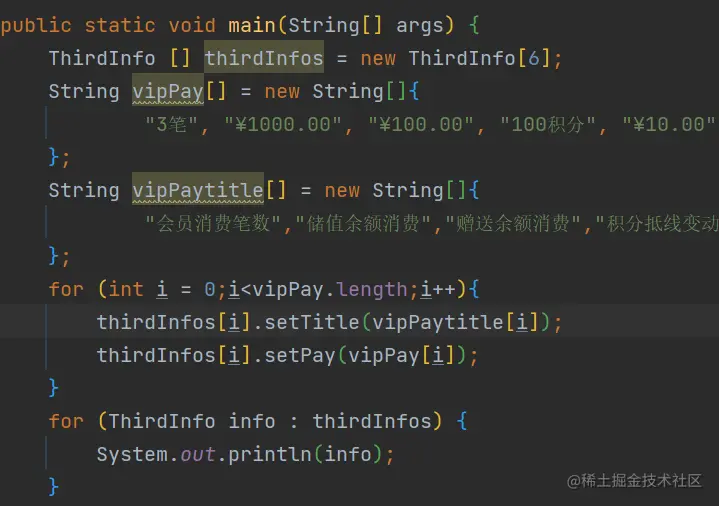
只看
new ThirdInfo[6];和 thirdInfos[i].setTitle(vipPaytitle[i]);部分的字节码文件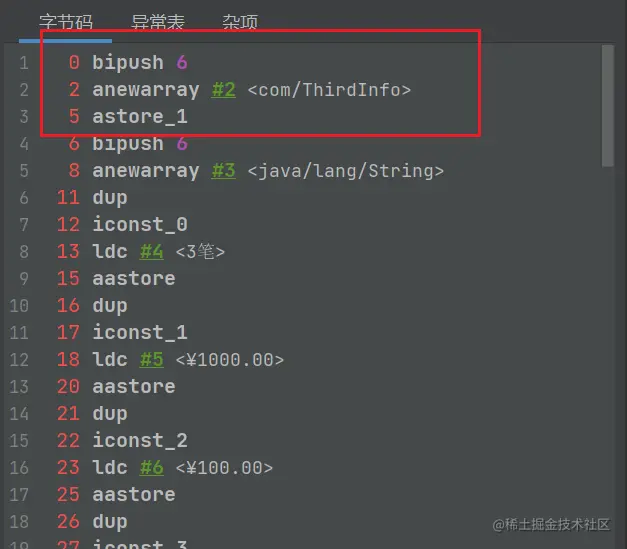
圈出来的这三行字节码代码就是
ThirdInfo [] thirdInfos = new ThirdInfo[6];的展示- bipush 6 // 将6压入操作数堆栈。
- anewarray #2 <com/ThirdInfo> //创建一个引用型(如类,接口,数组)的数组,并将其引用值压入栈顶
- astore_1 //把栈顶的值存到第一个变量(thirdInfos )
- 复制代码
能不能看懂都没事,我们来看看第二个测试:
直接在方法中
new ThirdInfo(),我们看看它的字节码文件是什么样的。
- new #2 <com/ThirdInfo> // 创建一个对象
- dup // 复制栈顶数值(数值不能是long或double类型的)并将复制值压入栈顶
- invokespecial #3 <com/ThirdInfo.<init> : ()V> // 调用超类构造方法,实例初始化方法,私有方法
- pop // 出栈
- 复制代码
其实看到这里,就能够大致知道是什么原因了。
就是因为没有实例化,所以看起来
ThirdInfo [] thirdInfos = new ThirdInfo[6];好像是创建了6个ThirdInfo对象的这段代码,实际上,只是分配了内存空间。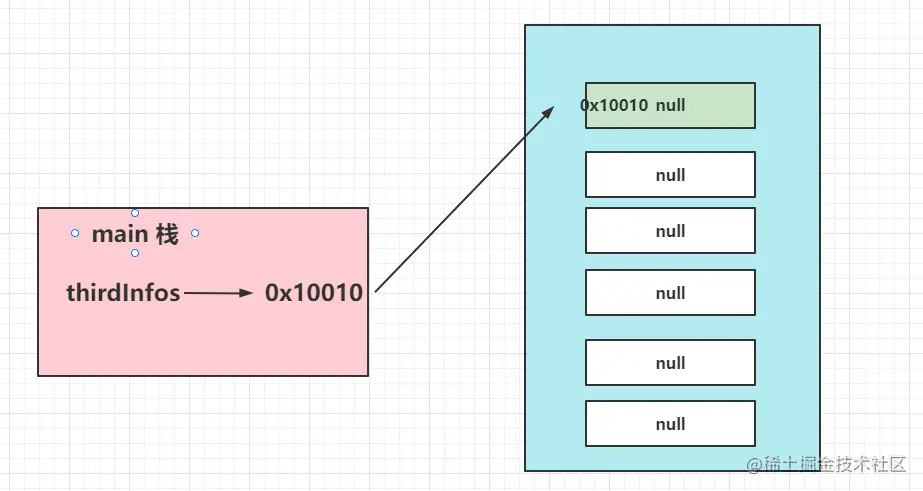
还可以换个更简单的方式来证实这个情况:
我利用反射创建
ThirdInfo对象进行输出,和输出ThirdInfo [] thirdInfos = new ThirdInfo[6];第一个对象,看看他们的结果是什么~- public class Test {
-
- public static void main(String[] args) throws ClassNotFoundException, InstantiationException, IllegalAccessException {
- Class<?> aClass = Class.forName("com.ThirdInfo");
- ThirdInfo o =(ThirdInfo) aClass.newInstance();
- System.out.println(o);
-
- ThirdInfo [] thirdInfos = new ThirdInfo[6];
- System.out.println(thirdInfos[0]);
- }
- }
- 复制代码

可以看到,实际上
thirdInfos[0]实际上就是null- ThirdInfo [] thirdInfos = new ThirdInfo[6];
- thirdInfos[0]=new ThirdInfo();
- System.out.println(thirdInfos[0]);
- 复制代码
只有进行实例化之后,才能正确使用。
反射他本质上也是进行了类的实例化的,这点从字节码中依然可以看出。

之前说到了
invokespecial是调用超类构造方法,实例初始化方法,私有方法invokevirtual的意思是调用实例方法.更详细的很难说,学过但我忘了
阅读字节码文件,也没你想的那么难,反正不会去查就好了,很多中文版手册的~
所以在使用前肯定都会去进行实例化的。
聊完这个,又回到了之前的问题上。
为什么
new String[6]可以?String也是个对象~说到这个,又回到了以前学
JVM的知识上来了.写了一小段代码,这是可以正确执行的
- String[] str = new String[6];
- for (int i = 0; i < 6; i++) {
- str[i] = ""+i;
- }
- for (int i = 0; i < 6; i++) {
- System.out.println(str[i]);
- }
- 复制代码
我们来看看他的字节码文件:

不知道大家还记不记得
String不可变性,当我们使用当对字符串重新赋值时,需要重写指定内存区域赋值,不能使用原有的value进行赋值。因为
String它的不可变性,看似只是改变str[0]=null的值,实际上将一个新的字符串("abc")赋值给str[0]时,真正改变的是str[0]的指向。看个简单的例子吧,是我以前文章里面的。
- public static void main(String[] args) {
- String str1 = "hello";
- String str2 = "hello";
- str1="abc,hao";
- // 判断地址, 它由true -->false
- System.out.println(str1 == str2);
- }
- 复制代码
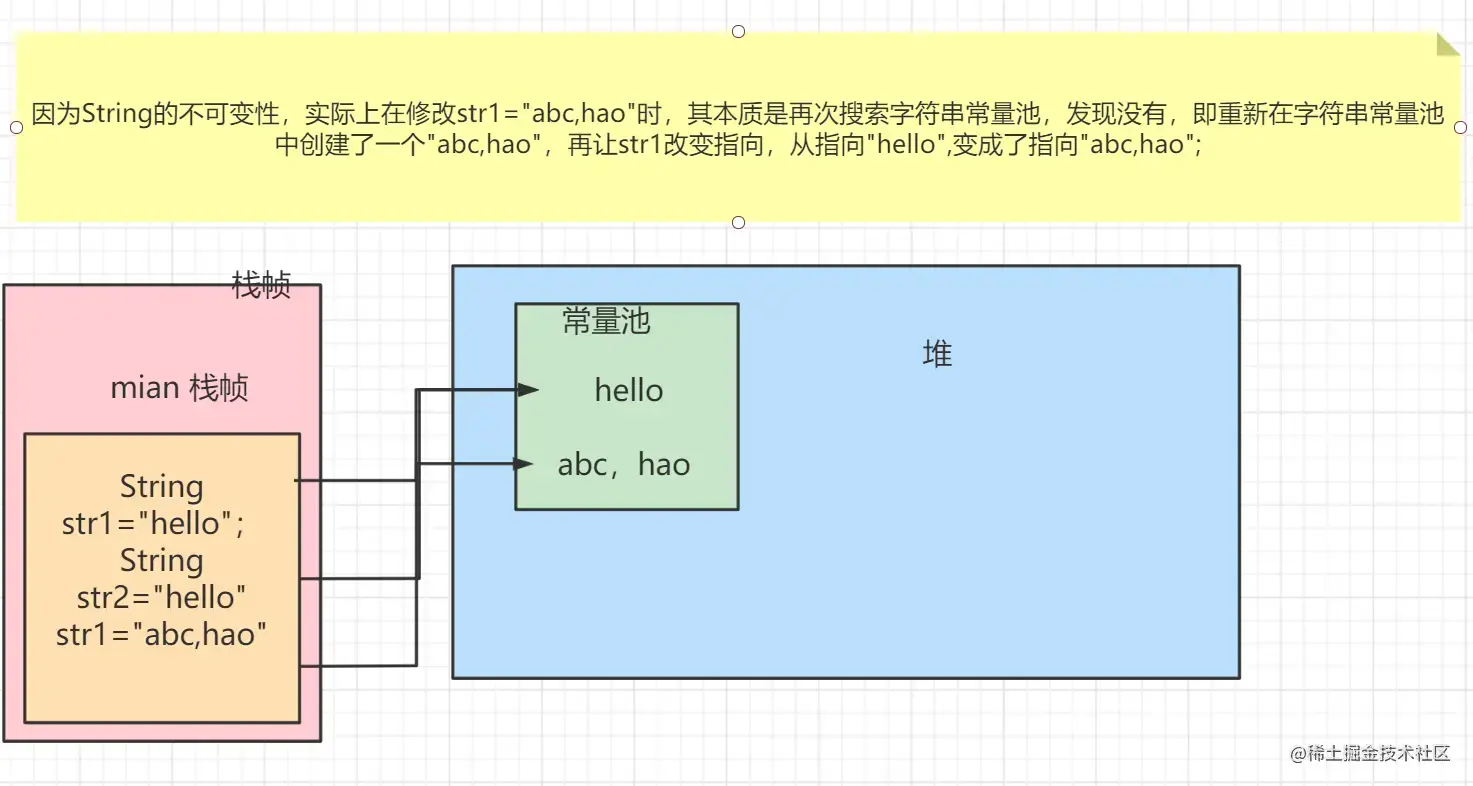
更详细的可以看看这篇
-
相关阅读:
perl学习笔记(十五)智能匹配
扣图(图像色彩空间转换)
Java笔记四(方法与递归)
[附源码]计算机毕业设计JAVA电子交易平台
通过数字证书获取CRL吊销列表
学生DW静态网页设计——html+css+javascript+jquery+bootstarp马尔代夫旅游响应式网站
golang实现正向代理和反向代理
数组扁平化的方法
ArrayList的线程安全类CopyOnWriteArrayList
阿里云体验有奖:使用PolarDB-X与Flink搭建实时数据大屏
- 原文地址:https://blog.csdn.net/m0_71777195/article/details/127569007
